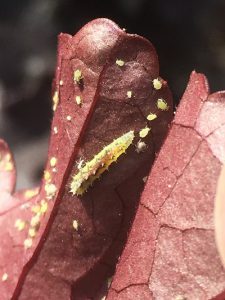When you hear the word “pollinator,” what comes to mind? Honeybees? Butterflies? How about flies? Wasps? Hummingbirds? Bats?
The diversity of pollinators is amazing. By using the principles of Florida-Friendly Landscaping in my yard, I’ve been lucky enough to see pollinators that I didn’t even know existed!
But, to be honest, it’s not really about luck at all…

Florida-Friendly Landscaping principles are designed to bring your landscape to life. Using the right plants for your site conditions, managing pests responsibly, and creating vibrant, functional habitat… if you build it, they will come!
(BONUS: Some of these pollinators perform beneficial services in return, like providing beneficial pest-patrols!)

In honor of National Pollinator Week, I’ve compiled a few pollinator-related tips & resources below. Just a few ways to help bring life to your landscape & community!
TIPS
- Provide sources of nectar & pollen throughout the year.
- NOTE: This doesn’t mean you need to find plants that can bloom all year long! In fact, very few plants can bloom non-stop, while still providing high-quality nectar & pollen resources. Instead, look to include a variety of different plants in your landscape (and around your neighborhood) that will take turns blooming seasonally throughout the year.
- Provide habitat & refuge.
- NOTE: This could include vertical layers of vegetation (like trees & shrubs), patches of bare, sandy ground for ground-nesting bees, branches, stems, and dead wood for cavity-nesters, bat houses, and more….
- Minimize the use of pesticides in your landscape and community.
- Follow the Florida-Friendly Landscaping principle of “right plant, right place.” It will help keep your plants in better health, making them less prone to pests.
- When pests arrive, be sure to identify them correctly, and determine whether any action is necessary. Some pests will only cause minor cosmetic damage, and will typically be controlled by beneficial insects – i.e. the “good bugs” – if you let them! Others can typically be controlled by targeted methods that avoid impacts on non-target beneficial organisms like pollinators. (HINT: Your local UF/IFAS Extension office can help!)
- Encourage your community to adopt Florida-Friendly Landscaping practices to help reduce over-reliance on pesticides, fertilizers, and irrigation. For more info on how to achieve this, check out the great resources below!
Excellent resources, just for you!
Q: How can I help my community become a little more “pollinator-friendly?”
A: The Florida-Friendly Landscaping Program has created a set of tools specifically to help HOA communities add Florida-Friendly Landscaping concepts directly into their deed restrictions. That way, you can keep your community looking great, while supporting pollinators too!
See: Florida-Friendly Landscaping™ Model Covenants, Conditions and Restrictions for New and Existing Community Associations – Model Covenants, Conditions and Restrictions – September 2010
See: A list of considerations for Florida-Friendly Landscaping™ guidelines for architectural review boards – FFL guidelines for Existing Communities
Q: We’d like to hire a landscaping company that will follow Florida-Friendly Landscaping Principles. What should we look for or ask about?
A: The FFL Program has developed several helpful resources to make it easier to hire landscape professionals who have been trained in Florida-Friendly Landscaping / Green Industries Best Management Practices.
See: Florida-Friendly Landscaping™ Management Contract: Model contract – editable (Microsoft Word) | Model contract – pdf
For a list of considerations for selecting a landscape contractor, and tips for writing an effective landscaping contract, please see: Florida-Friendly Landscaping™ Guidelines for Community Associations (pdf)
For a listing of landscape professionals who have been trained in “Green Industries Best Management Practices,” please see: Green Industries Best Management Practices (GI-BMP) Certification List
Looking for more information? Whether you want to attract hummingbirds, bees, butterflies, or bats, check out these excellent guides for helping to create a pollinator paradise –
Attracting Native Bees to Your Florida Landscape
A Guide to Planting Wildflower Enhancements in Florida
Webinar recording – ‘Garden Pests vs. “the Good Bugs”‘ – How to attract & support beneficial garden insects
UF EDIS – Butterflies Publications
UF Gardening Solutions: Hummingbird Gardening
Florida Wildflowers & Butterflies – From the Florida Museum
Attracting Bees – From Florida Wildflower Foundation
An interview with Dr. Rachel Mallinger about creating homes for bees
Attracting & Recognizing Hoverflies
Article: UF Research: Natural areas can help promote organic pest control
UF Research on the benefits of adding pollinator habitat to open spaces such as golf courses
About UF/IFAS Extension: UF/IFAS Extension serves as a source of non-biased, research-based information for the residents, businesses, and communities of Florida, providing educational materials and programs for adults and youth. We proudly “provide solutions for your life.”
(Not in Pasco County? Not a problem! Click here to find your local UF/IFAS Extension office!)
About the Author: As the Florida Friendly Landscaping (FFL) Program Coordinator in Pasco County, Frank works with the residents, homebuilders, and businesses of Pasco to help create attractive landscapes that DON’T require a lot of water, fertilizer, and pesticides. Through an innovative collaboration with Pasco County Utilities, the Pasco County FFL Program also provides on-site troubleshooting assistance to individuals and communities identified as high water users. His motto is – “Less guesswork, better landscapes.” Frank can be reached at fgaldo@ufl.edu
Thirsty for more FFL knowledge? Don’t forget to follow us on Facebook & Twitter!
Have an idea for a future post? Let me know at fgaldo@ufl.edu
by Frank Galdo
UF/IFAS Extension Is An Equal Opportunity Institution.
 2
2

